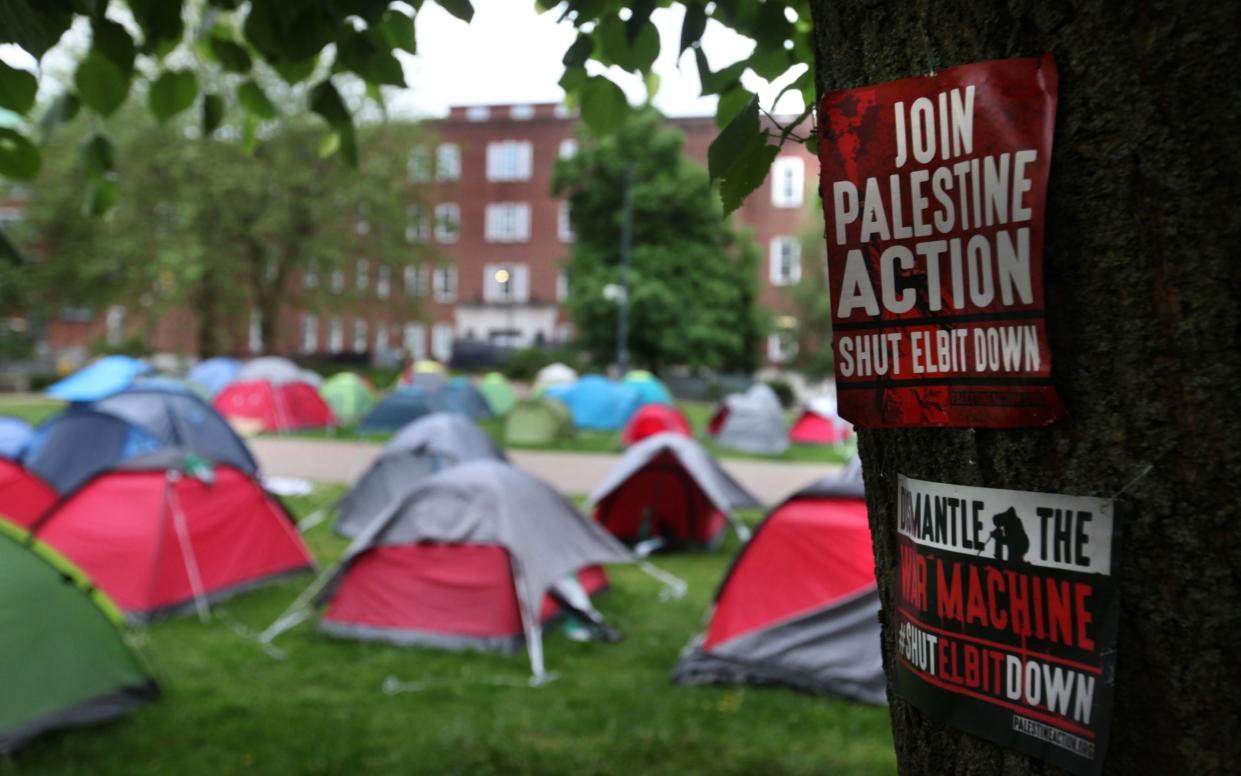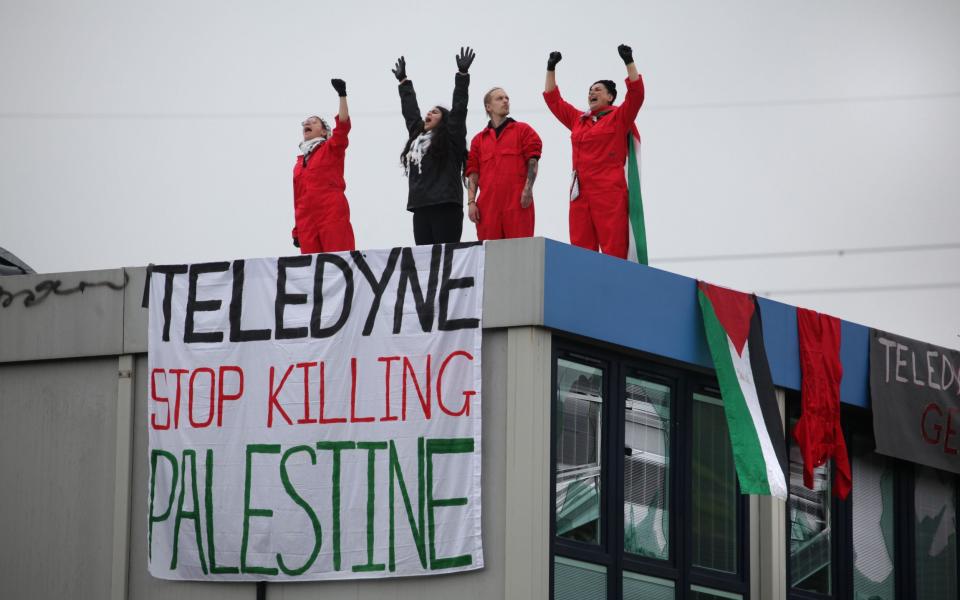Police to get powers to ban disruptive protests under new plans

Police are to get new powers to ban protests that are likely to intimidate and disrupt communities under plans being considered by ministers.
Chief constables would be able to block marches due to the “cumulative” disruption and “persistent” threats to public order caused by protests under changes to laws proposed in a report on political violence.
Police forces would be allowed to impose conditions on protests and limit their frequency under changes to public order legislation if they judged that it was diverting too many officers away from fighting crime in local communities.
Protest groups that regularly broke the law such as Palestine Action and Just Stop Oil could also face restrictions on their ability to raise funds and their “right to assembly” under a new system modelled on the Government’s list of proscribed terrorist organisations.
The proposals are among 41 recommendations drawn up by Lord Walney, the Government’s independent adviser on political violence and disruption, in a 291-page report presented to Parliament on Tuesday.
It follows complaints that the frequent pro-Palestinian marches through central London have turned it into a no-go zone for Jewish people and fuelled anti-Semitism in the wake of the Hamas terror attack on Israel on Oct 7.
James Cleverly, the Home Secretary, welcomed the report, which he said ministers would now consider implementing. “It is vital that we take action to manage and limit the impact of protests that descend into violence and disruption,” he said.
‘Vile anti-Semitism’
“In recent months, we have seen too often vile displays of anti-Semitism on our streets and aggressive, disruptive tactics deployed by some protesters.
“That’s why, over the coming weeks, the Government will look at Lord Walney’s recommendations on public order and changing the thresholds for imposing conditions on protests and the way in which they are applied.”
In his report, Lord Walney said the Government should amend the Public Order Act 1986 to expand the grounds on which a police force could recommend a march be banned beyond the current “narrow” grounds that it risked public disorder.
Forces would be able to block a protest where police “reasonably believe the procession will likely result in intimidation from threatening or abusive conduct, or where there is a demonstrable cumulative impact on serious disruption”.
Police would have to take account of the “persistence” of arrests at protests for stirring up hatred, causing harassment, alarm or distress or support for terrorism. Assessing the cumulative impact would focus on the “frequency of repeated demonstrations” and failure of organisers to limit disruption to acceptable levels.
Changes to the act would also allow police to “balance” the cost of policing protests with the right to protest and place limits on their frequency if they were judged to “disproportionately impact other policing priorities.”
The report was published as the Government’s previous legislation lowering the threshold for police intervention in protest was ruled unlawful in the High Court after a legal challenge by the civil liberties group Liberty.
Lowered threshold
The Home Office regulations lowered the threshold for what is considered “serious disruption” to community life, from “significant” and “prolonged” to “more than minor”.
The Government is appealing and could rewrite the legislation if it loses alongside any new Bill that it presents as a result of Lord Walney’s review.
His report also recommended that the Government introduce a “mechanism” to “restrict” the activities of protest groups which had a policy to break the law through the destruction of property or deliberately caused serious disruption or injury to the public.
Lord Walney said the system would be distinct from the list of proscribed terrorist groups but would sanction organisations which persistently interfered with the rights of others or impeded the “proper functioning of democratic institutions or businesses.”
“Sanctions attached to this restriction would include restricting the group’s right to assembly and its ability to fundraise,” said the report. Central and local government should also commit not to fund, work with or consult groups that advocated illegal action or facilitated intimidation or harassment, it added.
It confirmed the Government should develop a mechanism to allow individuals and businesses who could evidence significant personal harm or economic damage from illegal disruptive protest to claim damages from protest organisers.
Ministers should also consider the viability of requiring protest organisers to contribute to the policing costs when they held a significant number of large demonstrations which caused serious disruption or law-breaking. Police could get wider powers to use covert surveillance on extreme protest groups that broke the law.
Lord Walney also suggested there should be “buffer zones” around MPs’ constituency offices, council chambers and defence company sites to protect them from intimidation and threats by protesters, similar to those applied to abortion clinics.
We must place liberal principles at the heart of how we protect democracy from coercion
Lord Walney

When ambulances and thousands of people are stopped from going about their work by illegal roadblocks, we expect the perpetrators to be met with the full force of the law, writes Lord Walney.
When businesses are attacked and employees terrorised in their offices by activists, our social contract dictates that they are treated as criminals.
And when protest movements spill out on to our streets in orgies of hatred or intimidation of our elected representatives, we know they must be deterred.
It is our failure to, so far, meet those challenges posed by criminal activism which provides the alarming context for the publication of my review into political violence and disruption yesterday.
I began my work in the autumn of 2020, after being commissioned by then-prime minister Boris Johnson, and was asked to pay particular attention to the status of far-Right groups, but also the extreme Left, through the prism of the effectiveness of government’s understanding and responses to political violence.
Over three years I engaged widely with government and law enforcement authorities, including our security agencies, with international partners, academia, civil society, and those impacted by extreme protest movements, lawbreaking, and disruption.
I also commissioned polling and focus groups, carried out a formal call for evidence, extensively analysed primary open-source material from extreme organisations and commissioned a new piece of analysis on the ecosystem of the far-Left.
There are more than 100,000 words and 41 recommendations, but it is worth me reiterating that the right to peaceful protest is one of the bedrocks of our nation state.
Whether it’s the civil rights movement here in the UK during the 1950s and 1960s, or the 2003 march against the Iraq War, those demonstrations brought dignity, power, and sometimes success, to their causes.
We must hold true to those values. Which means we cannot allow chaos to be condoned, intimidation to be tolerated and brute force to win the argument.
Noble causes
Noble causes such as the battle against climate change have been hijacked by extremist groups determined to bypass democratic norms and cause maximum disruption to society.
At the same time hostile states have been emboldened, seeking to sow division in our communities by stoking hatred on our streets.
The lack of a sufficient deterrent effect to extreme protest through the courts has been exposed by the actions of militant groups such as Just Stop Oil and Palestine Action, who have seized on criminal sabotage and illegal disruption as their method of forcing their way into the conversation on their chosen causes.
During my review I found the influence of far-Right organisations at a relative low ebb, thanks in part to the Government’s policy of actively proscribing those who meet the terrorist threshold.
Still, while relatively limited in comparison to Islamist terrorism, the violent threat from the far-Right is significantly greater than that from the far-Left - with a Left-wing, anarchist and single-issue terror attack in the UK judged highly unlikely.
Britain’s strengthened public framework is also being severely tested by the weekly drumbeat of marches demanding a ceasefire in Gaza.
Even more seriously, there has been a level of disorder, anti-Semitic hate crime and support for proscribed terrorist groups at the marches which the police have, at times, appeared unable fully to control.
This trajectory should alarm us all and act as a wake-up call to the political establishment – particularly those of us on the centre and Left of politics, who tend to have been brought up in and around an environment of lively protest ourselves.
The current legal balance is leaving many deeply dissatisfied.
Public opinion
Polling carried out for this review shows that the Government is out of step with public opinion when it comes to the type of powers needed to maintain order versus the widespread disapproval of protesters using guerilla tactics.
By margins of two to one, those polled thought it was unacceptable for protestors to occupy public spaces such as buildings and public transport.
By a margin of three to one, they believed it was unacceptable to disrupt people’s journeys by blocking roads and public transport.
And defacing public buildings and property was opposed by 93 per cent of those surveyed.
It is time for the political world to catch up with the real world and see extreme protest movements as an unacceptable threat to our democracy, not an extension to it.
So, what to do.
Among my recommendations, one of the key proposals is to give police greater powers to refuse protests where they are causing high levels of cumulative negative impact in a particular area, not simply if they cause substantial risk of a riot on the day – the current bar for a ban.
I also recommend that government creates a mechanism to restrict the activities of organisations which have a policy of breaking the law to influence government and coerce the public.
It would be for a future home secretary to determine which organisations fit those criteria, but I note in my report the extensive ways in which Just Stop Oil and Palestine Action, and other splinter groups, deploy criminal disruption or sabotage in this regard.
The Prime Minister should call on the speaker of the House of Commons to convene a process to examine what it will take to enable MPs to go about their work without threat of violence or intimidation.
And we should consider strengthening the ability of law enforcement agencies to deploy covert surveillance to detect and stop serious illegal disruption. A sensitive but important area.
But changes in the balance of protections must form part of a bigger change of attitude. Those who are lucky enough to play a role in our parliamentary democracy need to be stronger champions of it.
That means government and mainstream political parties placing liberal first principles at the heart of how they seek to protect our democracy from coercion. These principles must include upholding parliamentary democracy and the rule of law, defending free expression and the free press, and not supporting or advocating for hostile states and non-state actors.
It’s now time for action. The integrity of our democracy depends on it.
Lord Walney is the government’s independent adviser on political violence and disruption

